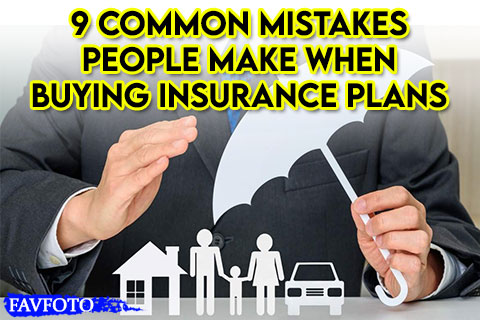9 Common Mistakes People Make When Buying Insurance Plans
When it comes to insuring your house, assets, health, and vehicle, a mistake can affect you financially. It might even be too late by the time you need your insurance coverage.
And because it’s necessary to protect your assets and finances, make sure you have the right type and amount of policy and understand the 9 Common Insurance Mistakes
Here are the 9 Common Mistakes People Make When Buying Health Insurance Plans, So Avoid these big mistakes to save money and get the coverage you need.

1. Selecting an insurance company by price alone
It is important to choose a company with competitive prices. But be sure the insurer you choose is financially sound and provides good customer service.
Check the financial health of a company with independent rating agencies, and ask friends and family members about their experiences with insurers. Select an insurance company that will respond to your needs and handles claims fairly and efficiently.
2. Not comparing the best plans
How would you know what is best for you without looking at different alternatives? Everyone has different needs and financial backgrounds. Buying a health insurance policy only because it is the same scheme your friend or your relative has bought would be a grave mistake.
You should always purchase health insurance after assessing your future needs and comparing different policies with each other to know what plan would be a perfect fit for you.
3. Failing to Ask for Discounts
Let your insurer know that you qualify so you can get credit for some discounts. You should look at policies that offer discounts for where you work or where you went to college.
The list varies from company to company but often includes installing a home alarm system, adding storm-proof shutters, taking a job with a shorter commute / not commuting anymore, carpooling, and even working at certain occupations.
4. Insuring your home for its market value
Insurance is designed to replace what you already have in case of loss. The cost of replacing a home is not related to its market value but is entirely dependent on the cost of materials, labor, and other things needed to rebuild it.
If you insure your home for its market value instead of its replacement value, you could be paying too much, since the market value of your home includes the value of the land. On the flip side, while home market values are high right now, that’s not always been the case, and you don’t want to be underinsured.
5. Young people do not need insurance
While it may be true that young people are healthier, it is also true that buying online health insurance should be the primary priority of everyone, irrespective of age. As life is full of uncertain events, they do not choose between young and old.
You should consider buying a health insurance plan even if you are in your 20s or 30s. Buying a health insurance policy online costs less, particularly for younger age groups.
6. Over or Under Insuring Yourself
The insurance you get could either be too much or not enough. It can be difficult to determine how much basic insurance you really need. When you are younger, you will not need as much insurance, since you do not have as many assets.
On the other hand, when you are stable and established, you should consider the maximum amount your insurance will cover needed expenses. You should talk to an insurance agent about your assets and how best to protect them.
Independent or company agents rely on the help of insurance virtual agents to handle activities that are too time-consuming so they are free of distractions when communicating with their clients.
7. Inadequate cover
People tend to buy a health insurance plan which they think will be light in their pocket. What they fail to understand is the insufficient and low amount these health insurance policies provide in the event of a health mishap. In the case of an actual emergency, this low coverage amount proves to be inadequate for covering the medical and hospital bills, thus creating a financial burden on the family.
It is therefore advisable that you buy an online health insurance policy that comprehensively covers all of your future healthcare needs.
8. Dropping Long-Term-Care Insurance
Many people with long-term-care policies were recently stunned by rate hikes of 40% to 90%. If your insurer notifies you that your premiums are about to soar, you might be tempted to drop your policy.
But because you’re older, a new policy will usually be more expensive than the old policy, even with the rate hike. Plus, rates for new policies have been rising even faster than rates for older policies. You can make the premiums more manageable by reducing the benefit period to three years, which is the average claim.
9. Ignoring the benefits of bundling
When you purchase more than one type of insurance – auto and homeowners, for example – from the same carrier, it’s called bundling. Bundling is a good way to save money. One way is through lower premium costs; another is to save by paying just one deductible if one incident, a hailstorm,
for example, damages both your car and your home. Bundling also saves you time, since you can make just one payment for all policies. That said, ignore the temptation to assume that just because you’re bundling your policies, you’re getting the best deal possible.
Conclusion: Insurance is a financial acquisition you make to protect yourself and your assets. Your job is to balance how much you spend against the protection that coverage provides. The decisions you must make along the way are complicated for sure, but we can help you avoid 9 common insurance mistakes through this discussion.